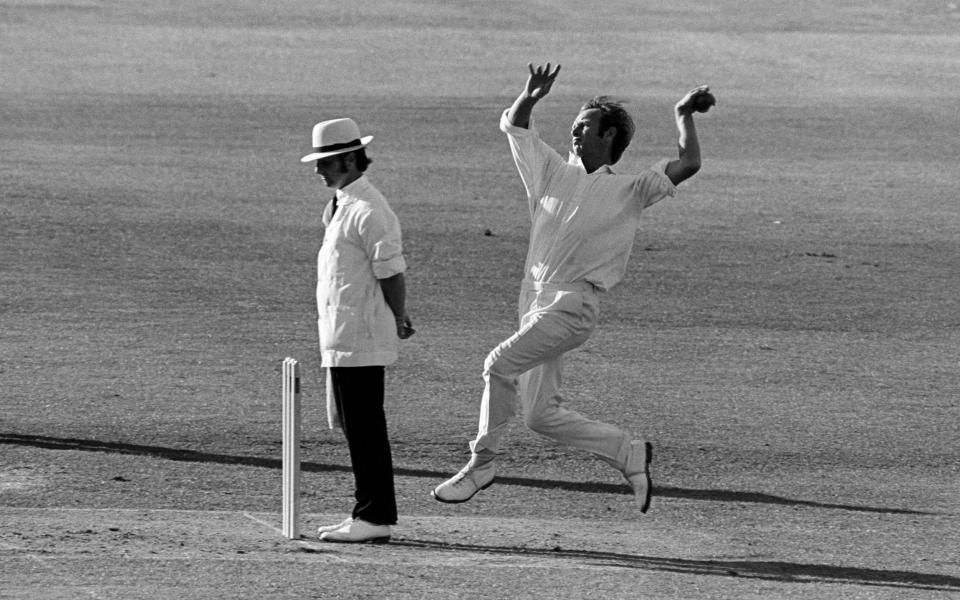Letters: Smoking is too deadly to remain an option for future generations

- Oops!Something went wrong.Please try again later.
- Oops!Something went wrong.Please try again later.
- Oops!Something went wrong.Please try again later.
SIR – The criticism of Rishi Sunak’s anti-smoking legislation (Letters, April 18) skirts over the fact that smoking more than doubles the risk of heart disease, significantly increases the incidence of heart attacks among younger people, and encourages the development of lung cancer and other pulmonary diseases.
In 1950 Richard Doll and Austin Bradford Hill first associated cigarette smoking with these conditions. The subsequent reduction in tobacco use in Britain meant that, by 2005, the proportion of men killed by it before the age of 70 had fallen from 20 per cent in 1970 to 5 per cent.
If a consequence of restricting cigarette sales to young men and women is that they lead healthier and longer lives, the benefits must surely outweigh the nanny-statism involved.
Dr S K Goolamali
Northwood, Middlesex
SIR – Unless you work in the tobacco industry, you don’t have much reason to be angry about a phased smoking ban. It’s younger generations that will lose the so-called freedom to use tobacco, not people who are currently allowed to smoke. All those who still want to buy cigarettes and cigars will remain able to do so. Non-smokers, meanwhile, can’t miss a habit they haven’t started.
In the past, smoking was something adolescents did behind their parents’ backs, like underage drinking. However, from what I’ve seen in recent years, this isn’t the case with British teenagers anymore. Even before vaping was introduced, smoking had been falling out of fashion, regarded as a bad, smelly activity that the average smoker spent the rest of their lives trying to stop.
An outright ban would probably create a black market, and I can understand concerns about that. But please don’t whine about freedoms. There are many dangerous intoxicants that are banned, but I don’t hear politicians championing the the right to take cannabis, ecstasy or LSD – drugs that may well be less harmful than tobacco.
Emilie McRae
Trowbridge, Wiltshire
SIR – Those who compare Rishi Sunak’s smoking legislation with other public-health measures, such as the wearing of seatbelts (Letters, April 18), ignore the fact that these measures were applied across the board. They did not create a situation where two adults could have different rights, depending solely on their date of birth.
Paul Leigh
Yateley, Hampshire
SIR – This legislation is being described as Rishi Sunak’s “legacy”. Compare that with the achievements of previous prime ministers. Boris Johnson, for all his faults, could at least point to Brexit.
If phasing out smoking is Mr Sunak’s legacy then that is pathetic.
Simon Gordon
Totnes, Devon
Labour vs ‘codgers’
SIR – Rachel Reeves, the shadow chancellor, has appointed Sir Edward Troup, a former head of HMRC, as one of her advisers (report, April 18). He thinks that “codgers” – of whom I am one – should pay higher taxes and lose benefits. Why?
Millions of us have worked hard all our lives. Today, millions are not bothering to find work and are getting benefits instead.
I started work the day after my 16th birthday. Office hours included Saturday mornings, and we got only two weeks’ holiday a year. In those days, if we did not have the money for something – including food – we could not have it. There were no credit cards. When our situations improved, we saved what we could for old age.
I worked like this for nearly 50 years. To even consider penalising people like me is outrageous.
Margaret Wade
London SW6
SIR – I retired at 60 and am now 68. I worked hard all my life, and my wife and I made sensible – though not extravagant – financial provision for our retirement. We did this entirely on our own initiative.
Many decades later, those provisions are now repaying our foresight handsomely, and the receipt of the state pension last year was a welcome boost.
Why, however, should I receive presents from the state – free bus and cheaper train travel, free prescriptions, help with fuel costs and cold-weather handouts? Why does the state offer such largesse – which, of course, I accept – to people who do not need it?
Worse, why is it also given to those who have not been so careful, and have for years spent their income on transient pleasures?
David Pearson
Haworth, West Yorkshire
Useless Thames Water
SIR – During the wet winter, sewage began flowing from a manhole in my village. Thames Water (report, April 18) was called and told that this waste was running through people’s gardens and directly into the nearby stream. “We have issues like this everywhere”, it replied – and nobody came.
More recently, a water main broke by my house and water started running down the road towards two cottages. To prevent flooding, I cut a trench to divert the water into the stream.
Ten days later, when Thames Water finally turned up, I was criticised for digging the trench, and told that the environmental team would now have to take samples from the stream to check for excessive chlorine levels.
How is this service either adequate or providing value for money?
David Taylor
Fringford, Oxfordshire
The hoarding magpie
SIR – Yes, magpies do cache their food (Letters, April 18).
I am greatly amused watching our local birds (of which there are far too many) tucking their finds under my neighbours’ roof tiles.
Elizabeth Briggs
Salisbury, Wiltshire
SIR – Most members of the crow family hide food when it is abundant, so that it can be eaten in leaner times.
My Jack Russell has cottoned on to this and rushes towards groups of crows as they feed on the fairways of the local golf course.
Often he is rewarded with a tasty morsel, which he retrieves from the turf, to the chagrin of the birds.
Fred Ford
Manchester
Birbalsingh’s victory
SIR – The High Court’s dismissal of the case brought against Michaela Community School by a pupil who demanded that she be allowed to undermine its secular ethos (Leading Article, April 18) comes as a great relief to those of us who admire the school and its remarkable head teacher, Katharine Birbalsingh.
Ms Birbalsingh must have suffered enormous stress as a result of this litigation, while continuing to manage her magnificent school. She deserves our thanks, and should be publicly honoured (Letters, April 18).
I am outraged that, as a taxpayer, I have been funding the legal costs of the pupil and parents behind this case. If they wanted to bring it, they should have paid for it themselves. And of those who permitted this obvious waste of money, one has to ask: is nobody in public service accountable for their incompetence any more?
John Twitchen
Leigh-on-Sea, Essex
SIR – Why aren’t there dozens of Michaela Schools around the country?
Nigel Coleman
Grimston, Norfolk
SIR – Katharine Birbalsingh should now be invited to head up a teacher training college. She could save several generations.
John Griffiths
Hythe, Kent
Shakespeare denial
SIR – Ros Barber (Letters, April 17) is a little misleading in stating that the anti-Shakespeare book by Elizabeth Winkler is a “set text on a Harvard history course”. It’s used by an educator at the Harvard Division of Continuing Education, which provides part-time classes for adult learners.
The book is the latest iteration of the hoary 19th-century prejudice that William Shakespeare of Stratford was too common to have written the greatest literature in the language, and must have been an allonym for someone else.
In the 175 years since this bizarre notion was first mooted, not a single piece of documentary evidence has emerged to connect any putative alternative author to Shakespeare’s works. Only the modern taste for conspiracy theories keeps “Shakespeare denialism” alive. Hence my protest (“Much ado about library event suggesting Shakespeare was female”, report, April 14) at the London Library giving such irrationalism an uncontested platform.
Oliver Kamm
London SW4
An early encounter with a cricketing great

SIR – I first met Derek Underwood (Obituaries, April 16) at Beckenham Cricket Club. Though he was quickly grabbed by Kent County, he never forgot the club, becoming a patron.
Derek and Alan Knott, the Kent wicketkeeper, had an incredible rapport, and this continued through to Test cricket, to the detriment of all the batsmen who faced them.
Derek also resurrected the ancient Kentish game of “bat and trap”, which flourishes to this day.
Lt Col Glenn Waltham (retd)
Chipstead, Kent
SIR – Can anybody else remember watching the 1968 Test match between England and Australia at the Oval?
In those days, the BBC evening news started at 5.45pm. The cricket was so exciting, however, that the news was interrupted to go back to the Oval, just in time to see a thrilling win by England.
I still think it was one of the best matches I ever watched – or is my memory playing games with me?
Marjorie Fagg
Southampton, Hampshire
The failing NHS is forcing patients to go private
SIR – On Monday the private Stoneygate Eye Hospital called to check on me following a procedure last Saturday, to treat a problem that my surgeon had noticed earlier in the week. This is in complete contrast to my dealings with the NHS Queen’s Hospital Burton, where I have been waiting for more than 12 months for a hip replacement – which has been cancelled three times.
I have paid taxes and National Insurance for 60 years, and having to resort to private healthcare is very annoying. It feels as though the NHS is just waiting for me to die.
Neville H Walker
Orton on the Hill, Leicestershire
SIR – As private healthcare expands due to the demise of the NHS, both physicians and surgeons are devoting more time to the sector. The financial rewards are considerable, and doctors are able to offer patients a more personal approach. This, as we all know, leads to better outcomes.
NHS cardiologists, gynaecologists and ophthalmologists direct desperate patients to smart private hospitals, where the cost of care is enormous. This is why private health insurance is thriving. Britain already has a two-tier healthcare system, with the same doctors working on each side of the fence. This is a “no-hope scenario” for the future of a precious institution, and political leaders and NHS managers must acknowledge that fact. No medical condition is improved by joining a waiting list. For those who can’t afford private care, the prospects are bleak.
Professor Stephen Westaby
Oxford
Letters to the Editor
We accept letters by email and post. Please include name, address, work and home telephone numbers.
ADDRESS: 111 Buckingham Palace Road, London, SW1W 0DT
EMAIL: dtletters@telegraph.co.uk
FOLLOW: Telegraph Letters on Twitter @LettersDesk
NEWSLETTER: sign up to receive Letters to the Editor here

